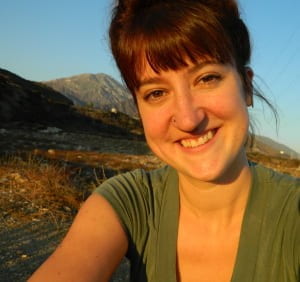Andrew W. Mellon Visiting Scholar in the Environmental Humanities (Spring 2021)
Heather Davis (Culture and Media)
Heather Davis is an assistant professor of Culture and Media at Eugene Lang College, The New School, in New York. Her current book project traces the ethology of plastic and its links to petrocapitalism. In 2017 she was the critical studies teaching fellow at the Cranbrook Academy of Art. From 2014-2017 she held a Mellon postdoctoral fellowship at the Institute for the Arts and Humanities at the Pennsylvania State University. Previously, she held a FRQSC postdoctoral fellowship in Women’s Studies at Duke University under the supervision of Elizabeth Grosz (2012-2014). She completed her Ph.D. in Communication Studies at Concordia University in 2011 on the political potential of community-based art. She has written about the intersection of art, politics, and ecology for numerous art and academic publications and lectured internationally, including at MoMA (New York), HKW (Berlin), the National Gallery of Canada, Yinchuan Biennale, and the Sonic Acts Academy (Amsterdam). She is the co-editor of Art in the Anthropocene: Encounters Among Aesthetics, Politics, Environments and Epistemologies (London: Open Humanities Press, 2015) and editor of Desire Change: Contemporary Feminist Art in Canada (MAWA and McGill-Queen’s UP, 2017). Davis will join CEF as our Mellon Visiting Scholar in Spring 2021.

Andrew W. Mellon Dissertation Fellows in the Environmental Humanities (2020-2021)
Hayley Brazier (History)
“The Seafloor and Society: Technological Innovation on the Pacific Seabed Transformation of North America”Hayley Brazier is a Ph.D. candidate in the Department of History. Her dissertation focuses on marine environmental history, with a particular emphasis on the influence of the Pacific seafloor in North American society. Hayley has taught courses on race and ethnicity in US environmental history, the national parks, and most recently—at the Sea Education Association in Woods Hole, MA, on oceanic history. In addition to her research interests, she has a background in the digital humanities and public history.

Tianna Bruno (Geography)
"Environmental Injustice and Black Sense of Place in the Biophysical and Social Afterlife of Slavery”Tianna Bruno is a Ph.D. candidate in the Department of Geography. Her dissertation, “Environmental Injustice and Black Sense of Place in the Biophysical and Social Afterlife of Slavery,” examines how the afterlife of slavery takes shape in environmental justice (EJ) communities within the U.S. South, and how Black life, sense of place, and joy persist even within spaces of environmental degradation, high death rates, and long histories of anti-Black violence. This multi-method project includes archival analysis, tree ring analysis, and Photovoice to attend to the complexity of EJ landscapes, which are simultaneously constituted by social and biophysical processes. This project reframes how EJ communities have been categorized and essentialized as dying and degraded, toward a more nuanced analysis that considers relationship to place and sense of place to highlight Black life.”

Andrew W. Mellon Postdoctoral Scholar in the Environmental Humanities, 2020-2021
Belén Noroña (Social Science and Rural Development)
Belén Noroña is an Ecuadorian researcher, educator and activist working at the intersection of social science and rural development. A recipient of a Fulbright Hays Fellowship, Belén obtained a doctorate in Human Geography in 2019 from the University of Oregon. During her post-doctoral fellowship year, she will prepare several scholarly articles and develop a website to make these stories available to a wider public. That website will also showcase six paintings representing women’s narratives and dreams that portray oil and gold extraction from women’s perspectives.
In her scholarship, Belén seeks to legitimize female indigenous non-western ways of knowing and thinking. Her current research engages with women’s dreams and storytelling she collected between 2017 and 2018 in the Amazon of Ecuador. These narratives illustrate how marginalized communities living near oil extractive sites experience and cope with state and oil related violence. She argues that the participation of marginalized women is imperative to understand how extractive activities such as oil generate racism and gender discrimination in systemic ways.
In addition to producing academic publications, Belén will make her results available to a wider public by coordinating her efforts with the Pachaysana Foundation. Pachaysana, an Ecuadorian NGO that Belén cofounded in 2014, specializes in fair-trade and informal public education. Diverse publics in Ecuador and the U.S. will be able to engage with Belén’s research through community-based art works (such as paintings and experimental theater) produced by rural Ecuadorian communities working with Pachaysana.

Andrew W. Mellon Dissertation Fellows in the Environmental Humanities (2019-2020)
Allison Ford (Sociology)
“Environmental Politics at the End of the World–Prepping as Environmental Practice”
Allison Ford’s dissertation explores the practice of prepping, in which individuals and families prepare to respond to emergencies, disasters, or the collapse of society, without relying on social institutions such as the state of market. Based on ethnographic data (message boards, blogs, and social media), Ford argues that prepping is an environmental practice because it involves renegotiating the material flows of food, water, energy, waste, and other facets of material life.

Rebekah Sinclair (Philosophy)
“Species Trouble: A Pluralist Problematization of the Discourse of Species”
Rebekah Sinclair’s dissertation argues that the species concept is an ethically problematic, historical specific, social and political construction. Working at the intersection of social philosophy, the environmental humanities, biology, and the philosophy of biology, Sinclair’s dissertation develops an interdisciplinary theoretical framework for demonstrating both that “species” is a social construct and that we can effectively question and dismantle it.

Andrew W. Mellon Visiting Scholar in the Environmental Humanities (Fall 2019)
M Jackson
 M Jackson has joined the Center for Environmental Futures for the 2019-20 academic year as the inaugural Mellon Post-Doctoral Scholar. A glaciologist, M earned her doctorate in geography from the University of Oregon, where she examined how climate change transformed people and glacier communities in Iceland. She is a National Geographic Society Explorer (and an Arctic Expert for NGS), a TED fellow, and a three-time Fulbright Fellow (two of which were joint awards with the National Science Foundation). Although she graduated from UO only two years ago, she is already an accomplished scholar and writer. Her award-winning memoir, While Glaciers Slept: Being Human in a Time of Climate Change (Green Writers Press, 2015), traced the parallel stories of what happens when the climates of a family and a planet change. Her second book, based on her doctoral dissertation, The Secret Lives of Glaciers (Green Writers Press, 2019) explored the profound impacts of glacier change on the human and physical geography of Iceland.
M Jackson has joined the Center for Environmental Futures for the 2019-20 academic year as the inaugural Mellon Post-Doctoral Scholar. A glaciologist, M earned her doctorate in geography from the University of Oregon, where she examined how climate change transformed people and glacier communities in Iceland. She is a National Geographic Society Explorer (and an Arctic Expert for NGS), a TED fellow, and a three-time Fulbright Fellow (two of which were joint awards with the National Science Foundation). Although she graduated from UO only two years ago, she is already an accomplished scholar and writer. Her award-winning memoir, While Glaciers Slept: Being Human in a Time of Climate Change (Green Writers Press, 2015), traced the parallel stories of what happens when the climates of a family and a planet change. Her second book, based on her doctoral dissertation, The Secret Lives of Glaciers (Green Writers Press, 2019) explored the profound impacts of glacier change on the human and physical geography of Iceland.
While in residence as a post-doctoral fellow at UO, she will work on a new book project, “Living Blue: Stories of Women and Ice” (written in both English and Icelandic), based on ethnographic interviews with Icelandic women. The book will focus on women’s stories of living in the shadows of receding glaciers and their local knowledge of ice.
Andrew W. Mellon Postdoctoral Scholar in the Environmental Humanities (2019-2020)
Nancy Langston
 Nancy Langston joins the Center for Environmental Futures during Fall 2019 as the inaugural Mellon Visiting Scholar in the Environmental Humanities. Langston is the Distinguished Professor of Environmental History at Michigan Technological University. Langston was trained both as an environmental historians and as an ecologist. In addition to numerous professional journal articles, she has published four books. Two of those books focused on Oregon’s environmental history, the prize-winning Forest Dream, Forest Nightmares: The Paradox of Old Growth in the Inland West (University of Washington Press, 1995), which examined the history of forest policy and the cause of the forest health crisis in Oregon’s Blue Mountains, and Where Land and Water Meet: A Western Landscape Transformed (University of Washington Press, 2003), which explored watershed restoration and the creation of the Malheur National Wildlife Refuge. Her third book, Toxic Bodies: Hormone Disruptors and the Legacy of DES (Yale, 2010), considered how and why endocrine disrupting chemicals have saturated our bodies and our environments, and her most recent book, Sustaining Lake Superior: An Extraordinary Lake in a Changing World (Yale, 2017), focused on the interconnected histories of the health of watersheds, humans, and forests in the context of climate change. Langston is a former president of the American Society for Environmental History and a former editor of the field’s flagship journal, Environmental History. She had the honor or a prestigious appointment as the King Carl XVI Gustaf Professor of Environmental Science at Umeå University, Sweden, and has received fellowships from the Fulbright Program, the Marshall Foundation, the National Science Foundation, the National Humanities Center, the American Philosophical Society, and the American Council on Learned Societies.
Nancy Langston joins the Center for Environmental Futures during Fall 2019 as the inaugural Mellon Visiting Scholar in the Environmental Humanities. Langston is the Distinguished Professor of Environmental History at Michigan Technological University. Langston was trained both as an environmental historians and as an ecologist. In addition to numerous professional journal articles, she has published four books. Two of those books focused on Oregon’s environmental history, the prize-winning Forest Dream, Forest Nightmares: The Paradox of Old Growth in the Inland West (University of Washington Press, 1995), which examined the history of forest policy and the cause of the forest health crisis in Oregon’s Blue Mountains, and Where Land and Water Meet: A Western Landscape Transformed (University of Washington Press, 2003), which explored watershed restoration and the creation of the Malheur National Wildlife Refuge. Her third book, Toxic Bodies: Hormone Disruptors and the Legacy of DES (Yale, 2010), considered how and why endocrine disrupting chemicals have saturated our bodies and our environments, and her most recent book, Sustaining Lake Superior: An Extraordinary Lake in a Changing World (Yale, 2017), focused on the interconnected histories of the health of watersheds, humans, and forests in the context of climate change. Langston is a former president of the American Society for Environmental History and a former editor of the field’s flagship journal, Environmental History. She had the honor or a prestigious appointment as the King Carl XVI Gustaf Professor of Environmental Science at Umeå University, Sweden, and has received fellowships from the Fulbright Program, the Marshall Foundation, the National Science Foundation, the National Humanities Center, the American Philosophical Society, and the American Council on Learned Societies.
While in resident at the University of Oregon, she will work on a new project, “New Mobilities of the Anthropocene: Climate Change, Toxics, and Animal Migrations,” focusing on two iconic migratory species, woodland caribou and common loons.
Self-Funded Visiting Scholar in the Environmental Humanities (Winter 2020)
Sarah Marak
Sarah Marak is a PhD candidate and research associate at the University of Erlangen-Nuremberg, Germany, at the department of English and American Studies. She is currently working on a dissertation on radical environmental activism, which focuses on the negotiation of ‘eco-terrorism’ in cultural productions from the US from the 1970s to the present. Her research interests include critical terrorism studies, popular culture, history in fiction and film, nostalgia and sentimentality, and ecocriticism. She serves as the project coordinator for the Global Sentimentality Project based in Erlangen and has taught undergraduate classes in cultural studies.

